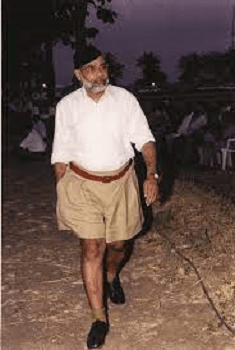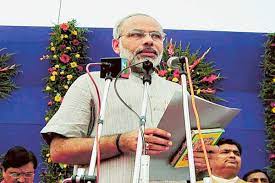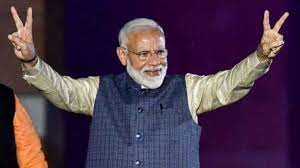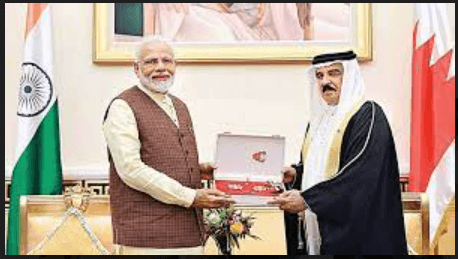Narendra Modi
On September 17, 1950, Narendra Modi was born into a Gujarati Hindu family in Vadnagar, Mehsana district, Bombay state (Present Gujarat). Hiraben Modi is his mother's name, and Damodardas Mulchand Modi is his father's name. He is the third child out of six. Modi used to help his father make tea at the Vadnagar railway Station when he was younger, and subsequently, he and his brother co-owned a tea business near a bus stop. In 1967, Modi completed his higher secondary education at Vadnagar, where his teachers classified him as an average student and a sharp, talented debater with a passion for theatre. His preference for playing larger-than-life characters in theatrical shows has influenced his political image. He is India's current vibrant, motivated, and committed Prime Minister. He was sworn in as India's Prime Minister for the first time on May 26, 2014, and for the second term on May 30, 2019. He is also Gujarat's longest-serving Chief Minister (from October 2001 to May 2014). He has been Gujarat's Chief Minister for the fourth consecutive term. He is a highly motivated individual who has progressed from a poor tea-selling youngster to a development-oriented leader. He is the Bharatiya Janata Party's most renowned leader (BJP) and also a superb strategist for the Party. His constituency seat is Varanasi, or he is a member of parliament from Varanasi. Personal LifeModi's parents planned his marriage while he was a youngster, according to Ghanchi custom. He met Jashodaben Modi when he was only 13 years old and wedded her when he was 18. They grew apart when Modi embarked on a two-year journey that included trips to Hindu ashrams. Their marriage was reportedly never completed, and he kept it a secret since he would not have been able to join the Puritan Rashtriya Swayamsevak Sangh as a 'Pracharak' if it had been. Modi maintained his wedding a secret for the majority of his career. There was a powerful bond between Modi and his mother. Modi was the first Indian candidate to connect with citizens in a live conversation on Google Hangouts on August 31, 2012. Modi is a workaholic and introvert who is a vegetarian and lives a frugal lifestyle. Since 2002, he has had a chef named Badri Meena. Modi is also a fashion icon for many due to his attractive dressing sense. His crisply half-sleeved kurta and suit drew the public and the media interest. Scholars and biographers have characterized Modi's hyperactive, arrogant, and magnetic demeanor. Early Political Career
Narendra Modi faced numerous difficulties and obstacles throughout his youth, but he regarded them all as possibilities and utilized bravery and tenacity to transform them into opportunities. He learned the concepts of Generosity, Social Responsibility, Devotion, and Patriotism after joining RSS. Narendra Modi has always been zealous and passionate about serving and supporting those in need. During the Indo-Pak conflict in 1965, Narendra Modi volunteered his services to soldiers at railway stations as a young child. During the 1967 Gujarat floods, he also assisted those who were impacted. Modi began his work in the Gujarat State Road Transport Corporation's employee canteen. He eventually became a full-time RSS supporter and campaigner, known as a 'Pracharak.' Modi then proceeded to the RSS camp in Nagpur for training. Any RSS member who wants to assume an official position in the Sangh Parivar must complete the training course. Senior political figures were pleased by his involvement in the anti-emergency campaign. He was later named the regional planner of the newly founded Bharatiya Janata Party in Gujarat as a result of this. Narendra Modi has been a natural organizer since he was a child. During the Emergency, he planned to distribute RSS leaflets covertly and organized anti-Emergency rallies. In RSS, he met two Jan Sangh members, Vasant Gajendragadkar and Nathalal Jaghda, who later formed the Gujarat state chapter of the BJP. Narendra Modi was deputed to politics by the RSS in 1987 when it recommended his candidacy for the BJP. Modi's effectiveness was acknowledged, and he gained notoriety after directing Murli Manohar Joshi's Ekta Yatra. The Term as Chief Minister of Gujarat
Modi was named secretary of the BJP's national organization in New Delhi in 1995 and general secretary three years later. He stayed in that position for another three years, but in October 2001, he replaced Gujarat Chief Minister Keshubhai Patel, a fellow BJP member who had been held responsible for the state government's poor response in the aftermath of the massive Bhuj earthquake in Gujarat earlier that year, which killed over 20,000 people. In February 2002, Modi contested for the first time in a by-election and won a seat in the Gujarat state legislature. Keshubhai Patel's health deteriorated in 2001, and the BJP lost many state legislature seats in by-elections. Patel's reputation had been tarnished by his administration's handling of the Bhuj earthquake in 2001, and he was accused of abuse of authority, corruption, and incompetent management. The BJP's national leadership was looking for a new chief ministerial candidate, and Modi, who had expressed reservations about Patel's government, was picked. Despite the reality that BJP leader L. K. Advani did not want to remove Patel and was cautious about Modi's lack of leadership and direction, Modi rejected Patel's offer of deputy chief minister, telling Advani and Atal Bihari Vajpayee that he would "be entirely accountable for Gujarat or not at all." The Term of Prime Minister of India
In September 2013, Modi was elected as the BJP's prime ministerial nominee before the 2014 Lok Sabha election. Several BJP heavyweights, including BJP founder L. K. Advani, have opposed Modi's candidacy, citing concerns about leaders who are "obsessed with their agendas." In the BJP's electoral campaign, Modi was a key figure. Several BJP supporters stated that they would have voted for another party if Modi had not been the prime ministerial candidate. Narendra Modi was sworn in as Prime Minister of India on May 26, 2014, after the Bharatiya Janata Party-led National Democratic Alliance won a resounding victory in the 2014 Lok Sabha election. Modi also began his second term as a Prime Minister on May 30 2019, after the National Democratic Alliance, led by the Bharatiya Janata Party, won the 2019 Lok Sabha election. Modi became India's fourth longest-serving Prime Minister and the longest-serving non-Congress Prime Minister on December 6, 2020. Governance and Other InitiativesIn comparison to past governments, Modi's first year as Prime Minister saw a tremendous concentration of power. His centralization initiatives have been connected to a rise in top government employees retiring. Modi approved several ordinances to execute his ideas despite not having a majority in the Rajya Sabha, India's upper house of parliament, resulting in the increasing centralization of power. The administration also enacted a bill that increased the government's power over judicial appointments while limiting the judiciaries. Modi ended the Planning Commission in December 2014 and replaced it with the National Institution for Transforming India, or NITI Aayog. The change dramatically concentrated authority formerly held by the prime minister's planning committee. The planning commission had previously been chastised for causing inefficiencies in government and failing to fulfill its mandate of enhancing social welfare, but since the 1990s' economic deregulation, it has become the primary government entity in charge of social justice initiatives. Some Major Initiatives Were
Image in PublicModi lives frugally and is a vegetarian, teetotaller, workaholic, and introvert. He posted on Google Hangouts on August 31, 2012, making history by becoming the first politician in India to engage in live discussions with constituents. For his distinctive well, ironed, half-sleeved kurta and a suit with his name stitched on the pinstripes repeatedly, Modi has been dubbed a fashion icon. He wore the suit during a state visit by US President Obama, which attracted attention from the public and media and criticism. Modi's reputation as "one of contemporary India's most controversial and divisive politicians" was brought to light by his nomination for the position of prime minister. The BJP portrayed Modi as a powerful, masculine leader who would be able to make tough decisions throughout the 2014 election campaign. His campaign involvement has emphasized Modi as a person, an unconventional strategy for the BJP and RSS. Modi has leaned on his standing as a politician who fosters economic expansion and advancement. Controversies
Democratic BackslidingUnder Modi's leadership, India has taken a step backward in democracy. According to one study, the BJP administration "targeted nearly every existing mechanism to make the political executive accountable, either by guaranteeing that these institutions were obedient to the political executive or were managed by party members." Scholars also refer to the Modi government's official power to intimidate and silence opponents in the media and academia, eroding freedom of speech and alternative information sources. Several sources have claimed that the Modi government is an authoritarian conservative regime, despite the lack of strong opposition. Books Written by Narendra Modi1. JyotipunjJyotipunj' is a term used by Narendra Modi to describe all of the people he says inspired him and significantly impacted his career. Modi functioned with the RSS as a laborer before becoming a 'pracharak'. In this book, he goes into great depth about the people that have influenced him. The book also includes a reflection on these people's ideas. 2. Samajik Samarasata'Samajik Samarasata' is a collection of papers and talks by Narendra Modi. "Express your thoughts not merely through words but also deeds" is a fitting slogan for this book. Modi's beliefs in societal peace, with no discrimination based on caste, are reflected in this book, detailing many of Modi's meetings with Dalits. Many social reformers' life events are also recounted. 3. Abode of LoveNarendra Modi's 'Abode of Love' is a collection of eight short tales. Modi wrote it while he was pretty young. These tales illustrate the sensitive and caring side of his personality. Modi thinks that a mother's love is the wellspring of all love and the most powerful love. Every form of love - that of lovers, friends, and so on - mirrors a mother's love. In a lovely way, the book unravels the layers of human interactions. Awards and Achievements
ConclusionA notable political career has shaped Narendra Modi's life. He gained popularity as a BJP leader and held the office of Gujarat's Chief Minister from 2001 to 2014, during which time he rose to popularity. After guiding the BJP to a resounding win in the general elections, he was elected Prime Minister of India in 2014. In addition to launching programs like "Make in India," "Digital India," and the "Swachh Bharat Abhiyan" (Clean India Mission), Modi carried out other economic and social reforms throughout his time as prime minister. He also significantly influenced India's foreign policy to improve relations with other nations and raise India's status internationally.
Next TopicDR. A.P.J ABDUL KALAM
|
 For Videos Join Our Youtube Channel: Join Now
For Videos Join Our Youtube Channel: Join Now
Feedback
- Send your Feedback to [email protected]
Help Others, Please Share










